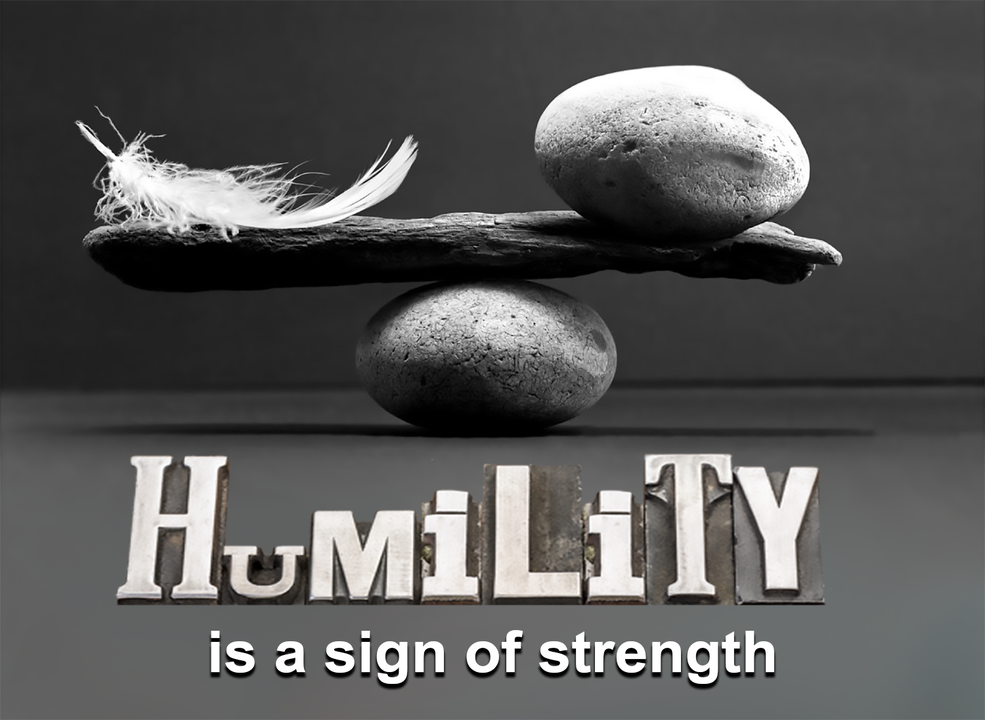Being humble is quite difficult. Here are three suggestions for dealing with your ego.
Given the growth in narcissism among our youth, I feel we could all benefit from a little more humility as a human.
In our culture, which places so much emphasis on external accomplishments, looks, and self-aggrandizement—all of which are fleeting at best—even a tiny showing of this modest virtue can make one feel like a drowning man coming up for air.
Why, therefore, is it so difficult for us to be humble? Is it because we often mistake its active presentation for a sign of weakness when it is, in fact, a sign of enormous strength?

Why is it beneficial to be humble?
My shoulders relax, my heart beats a little slower, and something inside me lets go when I encounter someone who exudes humility.
Why? Because I know I'm being fully seen, heard, and accepted for who I am, flaws and all—a priceless and uncommon gift that allows us to let down our protective walls.
Because they acknowledge and accept their own talents and shortcomings without defensiveness or judgment—a basic characteristic of humility, according to psychologists, and one that cultivates a great compassion for humanity—truly humble people are able to give us this kind of gift.
Grounding one's worth in our intrinsic value as human beings rather on things like six-figure salaries, the body of a movie star, ascending the corporate ladder, or the amount of Facebook friends leads to this kind of self-acceptance. Instead, modest people place a high value on things that are more meaningful to others, such as noble traits.
They also see life as a classroom, realizing that though none of us are perfect, we can improve on our flaws by being open to new ideas, suggestions, and criticism without harming our self-esteem.
The most striking example of this technique alone, creating an awe-inspiring inner strength, is Gandhi, whose Autobiography is a voyage of humbling self-dissection. He famously remarked, "I confess to be a simple individual liable to err like any other fellow mortal." However, I concede that I am humble enough to admit my errors and retrace my steps.”
If Gandhi is an example of what a humble leader can achieve, then this type of government will benefit society. Consider what experts studying the "quiet ego"—a concept akin to humility—suggest happens when we gain control of our ego: we're less inclined to act violently, influence others, display dishonesty, or damage resources. Instead, we accept responsibility for our mistakes and fix them, listen to other people's opinions, and maintain our strengths in perspective.
Who wouldn't want a leader like that in charge of our country—and the world?
Our leaders, though, aren't the only ones who gain from humility. According to recent study, this wonderful feature is beneficial to both individuals and relationships. For example, humble people are better at dealing with stress and have higher levels of physical and mental health. They are also more generous, helpful, and grateful, all of which can only serve to bring us closer to others.
Three pointers on how to develop humility
Given what scientists have uncovered about humility, it's clear that nurturing it isn't for the faint of heart, and it doesn't arrive suddenly. However, it appears that one of the greatest benefits of humility is the internal freedom from the need to guard those parts of ourselves that we strive to hide from ourselves and others. To put it another way, we cultivate a heart that is peaceful, sensitive, and understanding.
Here are a few ideas based on scientific evidence.
1. Accept your humanity
Many people's self-esteem plummets when they fail at something essential to them—a job or a relationship, for example—because they have attached their self-worth to those things. We become awful or unfit individuals all of a sudden, and the road to rehabilitation might be long.
People who are humble, on the other hand, do not have this problem. As previously said, their ability to bear failure or criticism stems from their fundamental value as human beings rather than external means. So, just because they fail at a task or don't meet expectations doesn't mean there's a problem with them. It just implies that they, like the rest of us, are human.
Secure attachment, or the good emotional link created with close others, such as our early caretakers, is thought to be the source of this inherent value, according to scientists. When we're young, having the experience of unconditional acceptance and affection might act as a buffer against the repercussions of criticism or failure.
Unfortunately, many of us did not have strong attachments as youngsters. According to one study, 40 percent of adults are not securely attached , yet this does not mean we are doomed. Healthy adult relationships, such as friendships, romantic partners, or even with a higher power, can help us heal.
2. Develop self-compassion and mindfulness.
Mindfulness and self-compassion have been associated with increased psychological resilience and emotional well-being in recent years. Without them, I can't imagine gaining humility.
According to scientists, modest people have a true view of themselves, including both their flaws and their strengths, which allows them to recognize what has to be changed within.
Mindfulness increases our self-awareness by allowing us to pause and observe our thoughts and feelings without judgment (judgement distorts our perception of ourselves).
It's simpler to notice where harmful thoughts and behaviours are limiting us as we become more conscious of our inner life. Self-compassion, or treating oneself with care and understanding, is required for recognizing and accepting those aspects of ourselves that are creating havoc and requiring transformation.
We may begin the transformation process once we accept what needs to change. “If you're in a dark room, don't beat the darkness with a stick,” a wise elder once said. Instead, switch on the light.” To put it another way, if we simply softly and slowly replace a bad thought or action with a positive one, we may not recognize the person we once were.
3. Thank people.
Saying "thank you" acknowledges the gifts that come into our lives and, as a result, other people's worth. Simply put, gratitude causes us to be less self-centered and more concerned about those around us, which is a characteristic of humble individuals.
Indeed, gratitude and humility are mutually reinforcing , according to a new study. Thanks can make us humble, and modest people can express gratitude more effectively.
Perhaps seeing life as a path toward fostering qualities that bring out the best in ourselves and others and make the world a better place is the secret to humility.
And this is not simply a journey for the normal individual; many of our greatest leaders have taken it. To sum up, Nelson Mandela, a man who understood humility, said:
As I have stated, the first step is to be completely honest with yourself. You can't change society unless you first change yourself...Great peacemakers are all persons of integrity, honesty, and humility.
Dear supporters, thank you for your time. If you like this article and find value in it please consider tipping to keep this going . Please Buy me a coffee:
